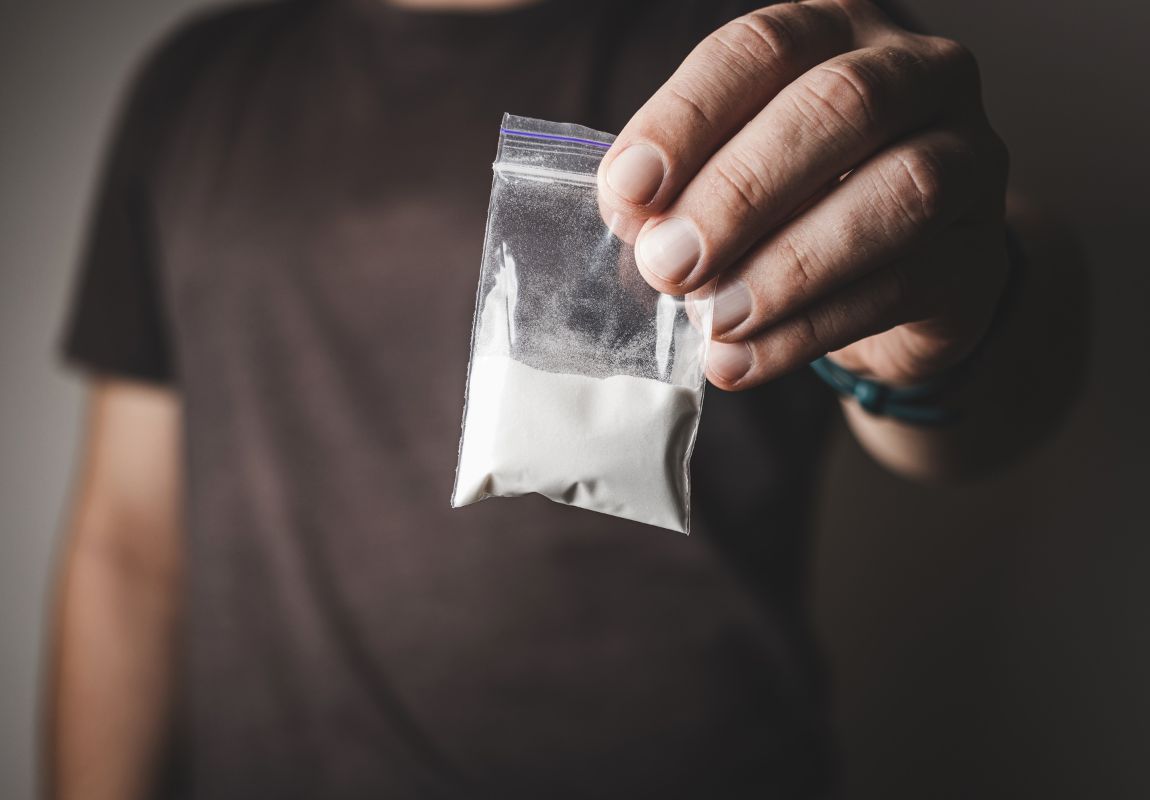Cocaine is an illegal stimulant drug that’s highly addictive. It creates a short but intense high and is extremely habit-forming. Many people wonder, “how long does cocaine stay in your system after using it?” The amount of time cocaine can be detected in your body depends on several factors.
What Is Cocaine?
Cocaine is a powerfully addictive stimulant made from the leaves of a coca plant native to South America. It turns into a white powdery substance that can be snorted, smoked, or injected for a quick high.
Cocaine comes in a few different forms:
- Powder cocaine is a fine, white crystalline powder that’s typically snorted. People also inject cocaine with needles for a more intense but shorter high.
- Crack cocaine is a form of cocaine that’s processed into a rock crystal form, heated, and smoked. For those wondering, “is crack cocaine,” the main difference between crack and cocaine the speed of delivery. Compared to cocaine, crack delivers a quicker and more intense high. It’s also more addictive, cheaper, and carries greater social stigma.
Known by many street names, such as coke, blow, and snow, cocaine is a strong stimulant that speeds up the body’s central nervous system. It can make you feel more alert, energetic, talkative, and happy. These positive effects are likely the reason for its widespread use. In 2020, over 5 million Americans aged 12 and older reported using cocaine in the past year. Out of all illicit drugs, cocaine use remains incredibly popular, second only to marijuana.
How Does Cocaine Work?
Similar to other stimulants, cocaine floods the brain’s reward system with the feel-good chemical dopamine which results in an intense euphoric effect. With repeated use, the brain starts to need cocaine to feel normal. Cocaine addiction can develop quickly, even after trying the drug only a few times. As a result, 1.5 million people meet the DSM-5 criteria for cocaine use disorder (CUD).
No matter how it’s used, cocaine is a dangerous, addictive substance that comes with serious health risks like heart attack, stroke, and sudden death. This is because cocaine narrows blood vessels, raises blood pressure, and increases heart rate and body temperature, which can be dangerous.
Get confidential help from our addiction and mental health treatment facilities located across the United States. Call to join one of our quality programs today!
Speak With Our Admissions TeamHow Long Does Cocaine Stay in Your System?
If you are concerned about how long cocaine will stay in your system, it is important to understand that the exact amount of time can vary based on individual factors such as metabolism, frequency of use, and overall health.
However, there are some drug testing guidelines that can give you an idea of what to expect. In general, cocaine can be found for different lengths of time in blood, saliva, urine, or hair tests.
How long does cocaine stay in your blood?
When it comes to blood tests, cocaine can typically be detected within 1-2 days after last use. This is because the drug enters the bloodstream quickly and then leaves just as fast. For heavy and chronic users, it may take up to 4 days for cocaine to be completely eliminated from the body. In general, blood testing looks for actual cocaine rather than its byproducts.
How long does cocaine show up in saliva?
To find cocaine in saliva, there is an equally short window. Similar to blood tests, saliva testing can detect cocaine for 1-2 days after last use. For this reason, saliva tests are usually reserved for recent suspicious or on-the-job situations. Saliva tests can show up positive for cocaine metabolites, such as benzoylecgonine, which can remain in the saliva for a longer period of time.
How long does cocaine stay in urine?
To find cocaine in urine, there is a slightly longer window of time available. Urine tests look for cocaine byproducts that stay in the body longer. A common one is benzoylecgonine, detected for 3-4 days after moderate use. In heavy users, cocaine may show up for 7-10 days or more. Urine tests are the cheapest and most common testing process. However, cocaine disappears from urine faster than many other drugs.
How long does cocaine show up in hair tests?
Hair has the longest detection window for cocaine, staying up to 90 days or more after stopping use. Cocaine byproducts get inside hair and can confirm use over long periods of time. Tests that identify cocaine in hair can estimate the amount of times the drug was used based on levels of the drug present. This is due to the fact that hair follicles contain a record of drug use during the past three months. As a result, these drug tests are often used in court cases when past drug use is under question.
What Effects How Long Cocaine Stays in Your System?
Many factors affect how long cocaine, and its byproducts, stay in the body. Factors that effect how long cocaine stays in your system include:
- Amount used – The more a person uses cocaine, the longer it takes to leave the body. Larger doses take more time to fully break down and remove from the body.
- How it’s used – When people inject or smoke the drug, it tends to leave the body faster than when people snort cocaine.
- How often it’s used – Frequent or long-term cocaine abuse can result on a build-up of cocaine in the body’s tissues and fat cells, increasing the time it remains in the body.
- Purity of the drug – Higher purity cocaine can stay in the body longer due to its stronger potency. This is why crack cocaine leaves the body faster than powder cocaine. The same principle applies to cocaine that is heavily mixed with baking soda or vitamin powders.
- Body chemistry – Cocaine leaves some people’s bodies faster based on their genetics, liver function, and metabolism.
- Hydration levels – The more hydrated the body is, the faster it can eliminate substances like cocaine. On the other hand, dehydration can slow down this process and prolong the presence of drugs in the body.
It’s important to keep these factors in mind when considering how long cocaine may stay in your system. While there are general guidelines for how long a drug may remain detectable, it ultimately depends on individual circumstances.
What Are the Signs of Cocaine Abuse?
Cocaine is a highly addictive stimulant drug that has serious physical and mental effects on the user. It is often glamorized in popular culture, but the reality of cocaine use can be devastating for both the individual and their loved ones.
If you or someone you know is using cocaine, it’s important to be aware of the signs of addiction and seek help if needed. Here are some key indicators that may suggest an addiction to cocaine:
Physical signs of cocaine abuse:
- Dilated pupils and bloodshot eyes
- Hyperactivity, constant talking
- Nosebleeds and runny nose
- Trembling and muscle twitches
- Weight loss and lack of appetite
- Sleep problems
Mental effects of cocaine abuse:
- Euphoria and heightened energy
- Irritability and aggression
- Paranoia and anxiety
- Restlessness and impulsivity
- Hallucinations and delusions
Behavioral changes caused by cocaine abuse:
- Neglecting responsibilities, such as work or school
- Financial problems due to spending money on cocaine
- Relationship issues with family members and friends
- Isolation from loved ones and social activities
- Risky behaviors, such as driving under the influence or unprotected sex
- Hiding drug paraphernalia like small bags and straws
If you or someone you know is experiencing these symptoms, it may be a sign of cocaine addiction. Seeking professional help is crucial in overcoming an addiction to cocaine.
Looking for quality treatment for substance abuse and mental health that’s also affordable? Aliya Health Group's treatment facilities accept most major insurance providers. Get a free insurance benefits check now!
Check Your CoverageWhat Is Cocaine Addiction Treatment Like?
Overcoming cocaine addiction is possible with professional treatment and support. In 2013, cocaine accounted for almost 6 percent of all admissions to drug abuse treatment programs.
When it comes to treatments for cocaine addiction, quality rehab programs provide comprehensive medical and psychological help, which may include the following:
- Cocaine detox – Often the first step to recovery, detoxification is a set of medical interventions which aim to manage extreme intoxication and withdrawal. During a cocaine detox, the body is gradually helped to get rid of cocaine with medical supervision. While cocaine has mild physical withdrawal symptoms, medications can help ease cravings and other psychological withdrawal symptoms. Medical supervision ensures safe detox from cocaine.
- Therapy – Therapy helps identify triggers, build coping skills, and prevent relapse. One type, called Cognitive Behavioral Therapy (CBT), teaches you how to change negative thoughts and behaviors linked to cocaine use. Regular sessions can help you deal with cravings and avoid using cocaine again.
- Drug addiction counseling – These counseling sessions provide education and substance use disorders and mental health issues to help clients better understand the impacts of cocaine addiction.
- Support groups – Group therapy and support from others in similar situations can be really helpful, too. Connecting with others in recovery provides accountability. Cocaine Anonymous groups exist worldwide.
- Aftercare and relapse prevention – Ongoing counseling, groups, housing, or other continuing care help maintain sobriety. Activities like mindfulness and yoga can also improve emotional well-being.
Cocaine Addiction Treatment at Aliya Health Group
At Aliya Health Group, we want to give people fighting cocaine addiction the help they need to stop. Since people need different kinds of help, our treatment centers offer a full continuum of care that includes:
- Medical detox and sub-acute detox
- Inpatient treatment
- Partial hospitalization program (PHP)
- Intensive outpatient program (IOP)
- Outpatient treatment
- Sober living residences
- Aftercare plans
With support, therapy, and the right care, individuals can break free from addiction and build a better future. If you or a loved one are struggling with cocaine, call us today at 888-973-2078 or fill out our secure contact form. Our highly qualified staff is ready to resolve any questions or doubts you may have and help you get back on your feet.
- Key Substance Use and Mental Health Indicators in the United States: Results from the 2020 National Survey on Drug Use and Health | Substance Abuse and Mental Health Services Administration (SAMHSA)
- How is cocaine addiction treated? Cocaine Addiction Report| National Institute on Drug Abuse (NIDA)
- Detoxification and Substance Abuse Treatment: A Treatment Improvement Protocol | Substance Abuse and Mental Health Services Administration (SAMHSA)
- Cocaine Anonymous. CA.org

















